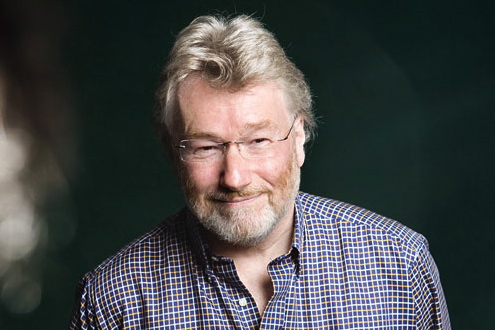 There’s surely no more fitting monument to a writer than the stories they inspire others to tell. As the shockwave of Iain Banks’ death swept through social media and around the world, a host of people—from fellow authors, such as Neil Gaiman and Ian Rankin, to loyal fans—felt moved to share their stories of the man, his work and his legendary escapades in the dark wee hours of numerous science fiction conventions.
There’s surely no more fitting monument to a writer than the stories they inspire others to tell. As the shockwave of Iain Banks’ death swept through social media and around the world, a host of people—from fellow authors, such as Neil Gaiman and Ian Rankin, to loyal fans—felt moved to share their stories of the man, his work and his legendary escapades in the dark wee hours of numerous science fiction conventions.
Of course, similar stories had already been doing the rounds since the beginning of April, after Iain announced on his website that, what with him being “a late stage gall bladder cancer patient”, he was expected to live for months rather than years. “I am officially Very Poorly,” he wrote; a first line which, thanks to its candid simplicity and subdued power, may well come to rival those of his most popular novels.
The connection Iain enjoyed with his many readers appeared effortless, though it was grounded on decades’ worth of book signings, SF conventions and book festival appearances. Nevertheless, it was wonderfully heartening to see Iain’s genuine surprise at the reaction to his news. “What an outpouring of love, affection and respect,” he wrote, a couple of weeks later. “I honestly had no idea.” He went on: “I feel treasured, I feel loved, I feel I’ve done more than just pursue the craft I adore and make a living from it, and more than just fulfil the only real ambition I’ve ever had – of becoming a professional writer. I am deeply flattered and touched, and I can’t deny I’ve been made to feel very special indeed.”
Having written a few in my time, I know that obituaries are ultimately stories not monuments; the latter, as far as Iain is concerned, is his published work, and the role he played in the commercial and artistic resurgence of Scottish literature since the 1980s. However, it may be a while before that important body of work can be properly assessed, not least because of a reluctance to let go of that supposedly iconic “Scottish” duality in his career. It’s far too simplistic to suggest Iain’s story as a writer was about a respected literary Dr Jekyll struggling for dominance over an uncouth, generic Mr Hyde; both strands to his career bled into one another repeatedly and, arguably, much of his best SF/fantasy work was actually published sans that “M” initial.
Nevertheless, science fiction readers loved the work of Iain M Banks with a passion; for its startling originality, its scale and optimism, its humour. He was also loved because he was so obviously ‘one of the tribe’, someone who knew the genre inside out and—most importantly—loved it passionately. For many years, one of Iain’s most unusual possessions was a copy of a novel by pulp fiction writer and Scientology creator L Ron Hubbard, which had been voted “the book most deserving that year of being taken to a rifle range and shot” by members of the Edinburgh University Science Fiction and Fantasy Society. That level of extreme criticism tickled Iain’s funny bone.
Iain apparently decided he wanted to be a professional writer aged 11, but it was no short story to success; it would take five years before he finished his first novel and then a further 14 years writing mainly science fiction—admittedly while also studying English, philosophy and psychology at Stirling University, and then working in a variety of clerical jobs around Scotland and down in London—before Macmillan took the risk to publish his controversial debut, The Wasp Factory. Briefly, some assumed Iain to be a new horror fiction star on a par with Clive Barker, whose Books of Blood had arrived around the same time. Iain, however, went on to produce Walking on Glassand The Bridge which, through their multiple narratives—realistic, fantastical and science fictional—suggested his path lay elsewhere.
For nearly two decades, Iain effectively wrote a book a year, usually in a concentrated period of three to four months. A few snobbish critics wondered if his novels might have been even better if only he’d spent more time on them. Ridiculous, of course; they dismissed not just his undeniable craftsmanship but also the hard graft during those concentrated days of writing. Perhaps they were distracted by not just the smoothness and clarity of his prose but also his commercial success. Yes, not all his novels “worked”; but, as Neil Gaiman pointed out, “Even the bad (books) were good, and the good ones were astonishing.”
That is the story of Iain (M) Banks that at least a few of us were able to share with the man himself before he left us.
Originally published by The List, 13 June 2013.